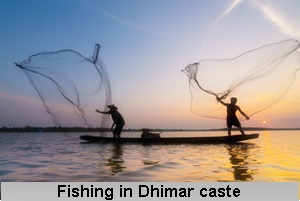Dhimar Caste
 The Dhimar caste, also known as Kahar, Bhoi, Palewar, Baraua, and Machhandar, is a Hindu caste primarily residing in the Central Provinces of India. While in some regions of the country the Bhois and Dhimars are recognized as distinct castes, in the Central Provinces they are considered synonymous and both names are used interchangeably. The term "Dhimar" originates from the Sanskrit word "Dhivara," which means a fisherman. The diverse aspects of the Dhimar caste include their occupational divisions, marriage customs, religious practices, and societal challenges.
The Dhimar caste, also known as Kahar, Bhoi, Palewar, Baraua, and Machhandar, is a Hindu caste primarily residing in the Central Provinces of India. While in some regions of the country the Bhois and Dhimars are recognized as distinct castes, in the Central Provinces they are considered synonymous and both names are used interchangeably. The term "Dhimar" originates from the Sanskrit word "Dhivara," which means a fisherman. The diverse aspects of the Dhimar caste include their occupational divisions, marriage customs, religious practices, and societal challenges.
Occupational Diversity in Dhimar Caste
The Dhimar caste comprises mainly of fishermen and palanquin-bearers, although they are also engaged in other occupations. Within the caste, various sub-divisions exist based on occupation or locality. Occupationally oriented names within the Dhimar community include Singaria, known for cultivating singara nuts, Nadha, who dwell along the banks of streams, Bandhaiyas, skilled in rope and sacking production using hemp and fiber, Tankiwalas, experts in sharpening grindstones, and Dhurias, who trade in parched rice. Moreover, the Dhimar caste encompasses several exogamous groups with titular or totemistic names, such as Baghmar (tiger-slayer), Ojhwa (sorcerer), Guru pahchan (knowledge of the teacher), Midoia (guardian of boundaries), Gidhwe (vulture), Kolhe (jackal), Gadhekhaya (donkey-eater), Kasture (musk), and others. Additionally, some groups derive their names from towns or villages, like Tumsare, Nagpurkar, and others.
Livelihood and Society of Dhimar Caste
Fishing remains the primary traditional occupation of the Dhimar caste. However, a few members may engage in agricultural activities. On occasion, Dhimars sustain their livelihood by selling sweet potatoes, dry grains, and rice. The caste also has set rituals concerning marriage, prohibiting unions within the same clan or between first cousins. Notably, widow remarriage is permitted within Dhimar society. Widow marriages typically occur during nighttime, except on Tuesdays, Saturdays, and Sundays. Divorce, though rare, is also recognized within their social framework.
Burial is the customary method of disposing of the deceased among the Dhimars. When it comes to naming children, they are either named on the day of birth or on the twelfth day afterward. Dhimars are known for their religious disposition and worship deities such as Dulha Deo, Shiva, Ganesha, Hanuman, and Lakshmi.
Caste Relations in Dhimar Caste
The Dhimar caste is often referred to as a subcaste of boatmen in India. Related communities include Dhinwar, Dhewar, Jhimar, Jhinwar, Jhiwar, Kanshilya, and Koshyal, and they can be found in states such as Uttar Pradesh, Haryana, Punjab, Madhya Pradesh, Maharashtra, and Chhattisgarh. While distinct castes are not recognized within the Central Provinces, regional variations and subcastes do exist.
Social and Religious Practices in Dhimar Caste
The Dhimar caste actively participates in Hindu festivals and celebrations. During the spring season, they join the broader Hindu community in Holi, the "festival of colors" or the "festival of love." Holi marks the end of winter and symbolizes the victory of good over evil. It is a joyous event that transcends caste and social boundaries, bringing people together in a spirit of play, reconciliation, love, and thanksgiving. Participants engage in the playful throwing of colored waters and powders at both friends and strangers, fostering a sense of unity and camaraderie. However, it is important to note that Holi, while celebrated with enthusiasm, is ultimately linked to the worship of deities that may not align with the Dhimar`s traditional beliefs.
Persecution and Challenges of Dhimar Caste
Persecution levels experienced by the Dhimar community vary across different states in India. Central Provinces, in particular, have witnessed the enactment of stringent laws that aim to restrict conversions to Christianity. Despite such challenges, Central India remains a significant mission field, and efforts to reach out to the Dhimar people and their response to these initiatives are steadily increasing.
The Dhimar caste faces numerous socioeconomic challenges, primarily stemming from their impoverished circumstances. Economic constraints restrict their access to resources and opportunities, exacerbating their physical and spiritual needs. As a marginalized group, they require support and interventions that address their fundamental necessities.
The Dhimar caste, predominantly residing in the Central Provinces of India, represents a distinct community with a rich heritage and diverse occupational divisions. Mainly engaged in fishing, they also participate in other professions such as palanquin-bearing, boatmen, rope weaving, grindstone sharpening, and selling various goods. Their marriage customs, allowing widow remarriage and limited divorce, reflect a unique cultural perspective.




















